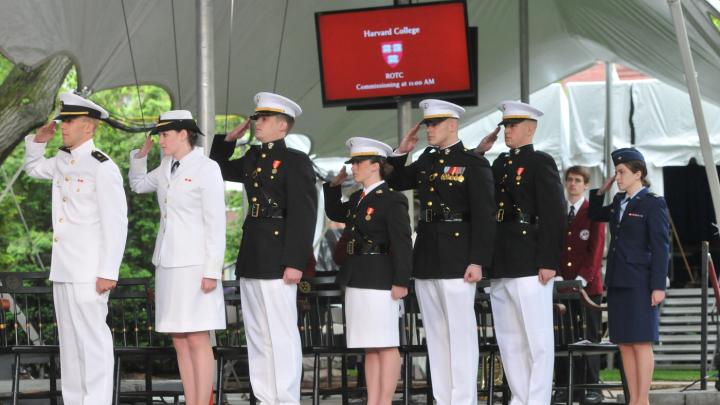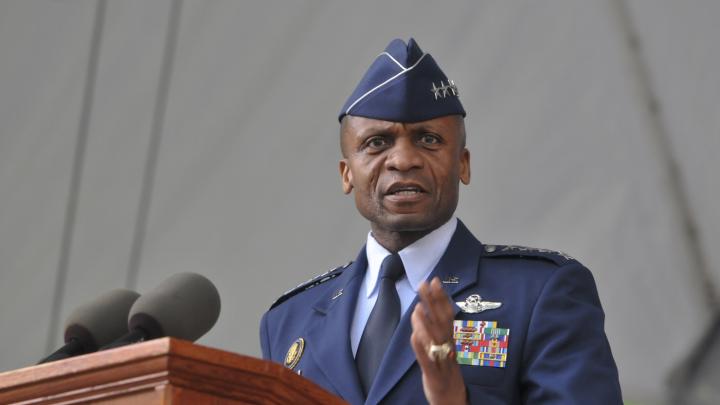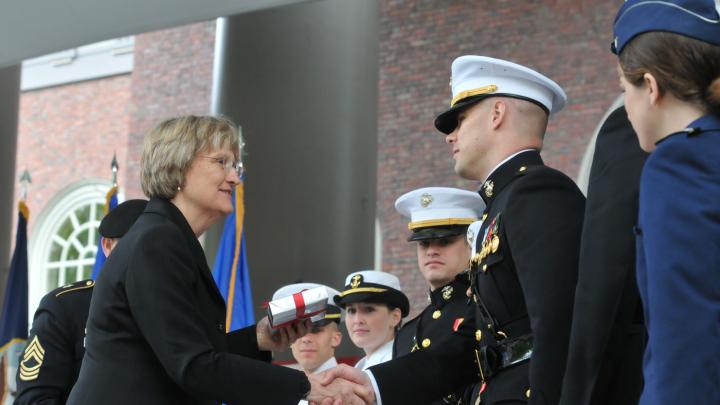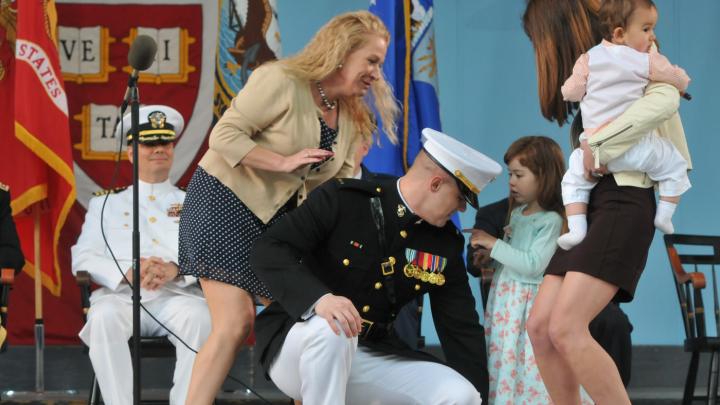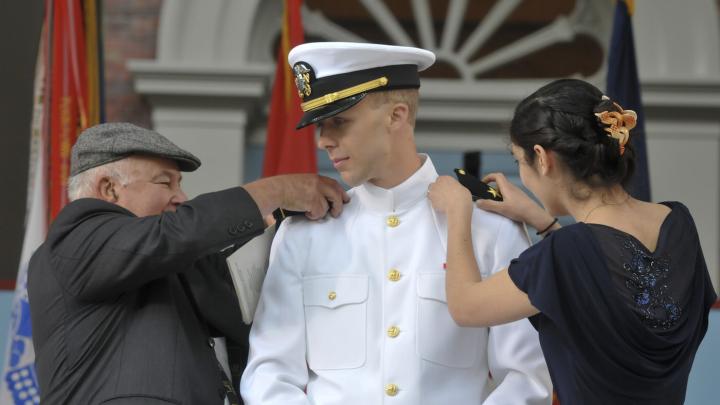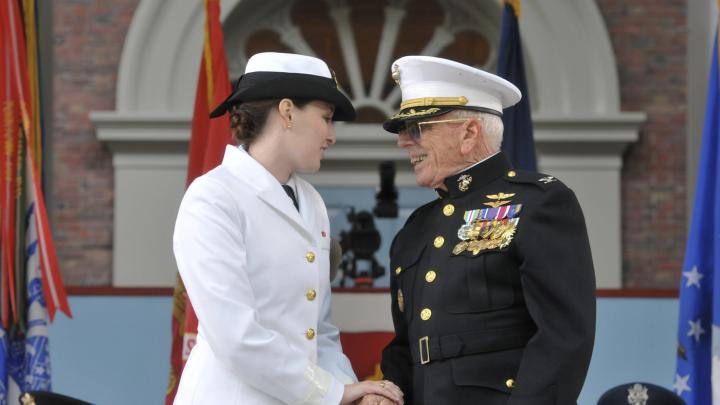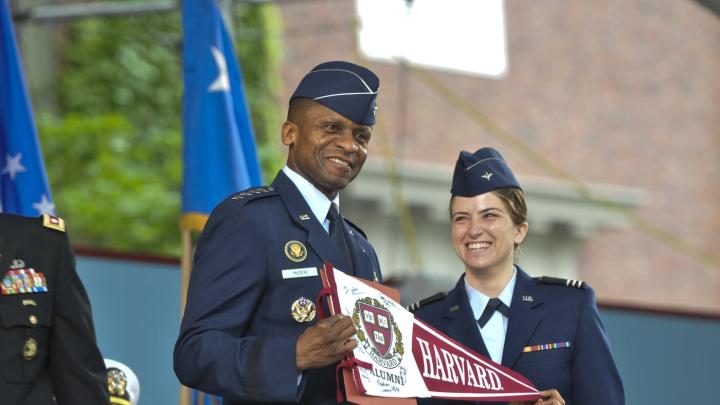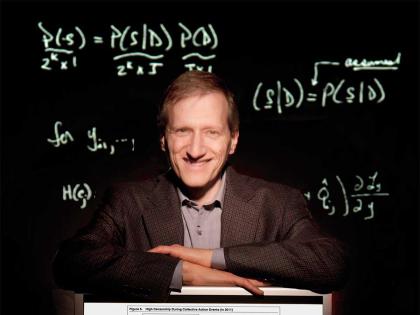Alongside the Memorial Church—built as a shrine to the Harvard dead of World War I, on the campus of one of the nation’s very first Reserve Officers’ Training Corps chapters—families, friends, alumni, and spectators gathered on Wednesday morning to witness the commissioning of seven new military officers from the College’s ROTC contingent.
Joining the U.S. Air Force is Second Lieutenant Madison Coveno, of Quincy House and Groton, Massachusetts, an East Asian Studies concentrator and “Air Force brat” following her father and grandfather into the service.
Joining the U.S. Navy are:
- Ensign Christopher J. Curtis, of Lowell House and San Diego, who concentrated in Near Eastern languages and civilizations; and
- Ensign Catherine M. Philbin, of Dunster House and Evergreen, Colorado, an environmental engineering concentrator whose late father was an Air Force general.
Joining the U.S. Marine Corps are:
- Second Lieutenant James S. Brooks, of Leverett House and Baltimore, a chemical and physical biology concentrator with a citation in French, both of whose grandfathers served in the U.S. Navy;
- Second Lieutenant Catherine A. Brown, of Cabot House and Mystic, Connecticut, who has completed a joint concentration in government and East Asian studies;
- Second Lieutenant Taylor B. Evans, of Winthrop House and Colorado Springs, a history concentrator, who enlisted in the Corps in 2005 and served as a cryptologic linguist in Korea until May 2010, prior to being selected for the Marine Enlisted Commissioning and Education Program and gaining admittance to Harvard; and
- Second Lieutenant Peter Machtiger, of Dunster House and Bronxville, New York, a government concentrator with a focus on international relations.
Their commissioning ceremony opened with a recognition of William “Bing” Emerson ’64, a Marine Corps helicopter pilot killed in action in Vietnam in 1968, and of the other alumni veterans present, including those from Emerson’s fiftieth-reunion class. The seven new volunteers, said the Army ROTC commander, Lieutenant Colonel Adam Edwards, had—like Emerson and his classmates—chosen service to others over service to themselves, fully knowing that service might put them in harm’s way.
Their guest speaker, General Darren W. McDew, as the leader of Air Mobility Command, represented service of a very concrete kind: the command’s mission is to provide rapid, global mobility and support for U.S. forces as well as humanitarian support in crises at home and around the world. In his address, he spoke more generally, distilling the core values of the four military branches to “honor, integrity, and selfless service”; thanking President Drew Faust for “the inclusive environment” she had fostered at Harvard in working to return ROTC to campus and thus demonstrating “Harvard’s commitment to both learning and service”; and telling the soon-to-be-officers, “We’re here to celebrate your pursuit of excellence and service”—especially noteworthy because, as members of the all-volunteer force, they represent less than 1 percent of all American citizens.
Though he touched with humor on this milestone for the new officers’ parents—“No more tuition checks, and yes, they have jobs. You have guided them from diapers to diplomas”—McDew made special mention of the service rendered by family members and supporting friends. “These young men and women are now ready to lead,” he said, “because you cared enough to instill in them the importance of giving back to their nation.” He pledged to give the new officers the best training and the tools that they would need to be successful. And he added, “On behalf of our commander in chief,…and a grateful nation, and the men and women of the armed forces they will lead: Thank you for letting us borrow these precious men and women.”
In her remarks, President Faust noted the approaching anniversary of the First World War and Harvardians’ service in that conflict, including that of two Medal of Honor recipients—Charles Whittlesey, LL.B. ’08, and George McMurtry, class of 1899—commemorated on a plaque in the church behind her. The new officers’ “admirable and honorable choice” honors those who have gone before them, she asserted, and she urged:
May you continue to support one another and to test yourselves. May you take full advantage of the learning that you have gained here to make a better world for others. We take pride in your dedication and your leadership. It’s an honor to congratulate you and your families on this very important day.
The speakers’ tributes to the officer candidates’ families materialized in the commissioning rituals that followed. Grandparents, parents, siblings, a fiancée, a wife, and two children took turns mounting the stage to pin on officers’ insignia or administer the oath of office as the commissionees’ classmates and friends cheered below. And as the program closed with the Harvard University Band’s brass quintet playing the four services’ songs, ending with “Off we go, into the wild blue yonder,” Second Lieutenant Coveno’s air force contingent burst into song themselves, reflecting a raw, damp morning brightened and warmed by pride in individuals and in service, and by love.
